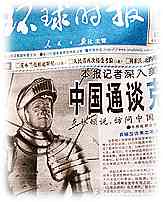|
|

Jewish World Review / June 26, 1998 / 2 Tamuz, 5758
Roger Simon
XI'AN, China -- I have often wondered why, on these foreign trips, the White House press
corps is forced to wear huge, colored ID tags around our necks.
In the United States, we get by wearing small tags on chains that contain a computer chip
so that the White House knows when we go into the building. (Someday, I expect, they will
also contain small, explosive charges, so that future presidents can just push a button and
blow our heads off.)
The press corps flew to China the day before the president so that we could grab some
sleep before the president arrived. The flight takes 18 hours with a brief stop in Alaska,
where you can get off the plane and buy beef jerky for $14 a bag. (The jerky does last
about a thousand years, however, and so I guess you could hand it down from generation
to generation, like an heirloom.)
We departed, as always, from Andrews Air Force base just outside Washington, D.C.,
where we learned that three reporters from Radio Free Asia had just been told by the
Chinese government that their visas had been revoked and that they could not enter China.
Some people thought that the rest of us should refuse to go to China as a sign of solidarity.
Most reporters thought, however: "Hey, I want to go to China! My kids are expecting
souvenirs!"
The decision to go was made easier because Radio Free Asia is funded by a U.S.
government agency, which means its reporters could be considered government
employees, not independent news reporters.
President Clinton had made the creation of Radio Free Asia (which is modeled after Radio
Free Europe) a campaign issue in 1992 and the refusal by China to let the reporters in was
an embarrassment and insult to him.
To make it up to the reporters, Clinton gave them an interview before he left for China, and
one reporter asked him how he expected to negotiate with the Chinese over important stuff
if he couldn't negotiate over piddling stuff like visas.
It was a good question (which means that reporter might soon be transferred to Radio Free
Antarctica) for which Clinton didn't have much of an answer.
"I think they made a mistake," he said.
In any case, the rest of us trooped onto our Cathay Pacific chartered 747 (for which the
press pays, as we should -- no tax dollars are wasted on us; they are reserved for $1,200
toilet seats). We immediately began the Great Game: What seat did we get?
The jet has first-class seats, business-class seats and tourist-class seats, also known as
steerage. We all pay exactly the same amount, however, so who gets what seat?
The White House decides, and people have been known to go nearly suicidal when they
get a bad seat.
As you might expect, the famous TV faces get the first-class seats, along with a few other
reporters thrown in. Sometimes, I get a first-class seat, and sometimes, I don't. But getting
a first-class seat is a double-edged sword.
Yes, the seats are plusher and wider and recline more. But, on the other hand, if you get a
first-class seat, you have to listen to Sam Donaldson for 18 hours.
So fortunately for me, I was given a seat upstairs on the 747, which was business class but
was also a Sam-Free Zone.
When we landed in Xi'an, a city famous for the thousands of life-size terra cotta warriors
unearthed in a tomb here, we were all more than a little bleary-eyed and ready for sleep.
But as we pulled up to the hotel, we saw that the employees had formed two lines, a
gantlet, through which we would have to pass.
And I figured that is why we had to wear the big, colorful press credentials: So everyone in
China would know who we were and could line up to beat us like gongs.
Why are you clapping? I asked one.
"You are reporters," she answered. "We are honored to have you here."
And that's when I knew we weren't in America
 Perks and the press
Perks and the press

Maybe the Chinese
know something we don't But as we got off the bus, the employees bursts into vigorous applause, which continued as
we passed between them.
But as we got off the bus, the employees bursts into vigorous applause, which continued as
we passed between them.
